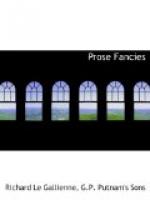To speak with authority, one should, doubtless, first sprout petticoats; and, meanwhile, one must rest content with asking the intelligent women of our acquaintance—whether man inspires them with anything like the feelings of reverential adoration, the sense of a being holy and supernal, with which woman undoubtedly inspires man. He is, of course, their god, but a god of the Greek pattern, with no little of the familiarising alloy of earth in his composition. He is strong, and swift, and splendid—but seems he holy? Is he angel as well as god? Does the dream of him rise silvery in the imagination of woman? Is he a star to lift her up to heaven with pure importunate beam? I seem to hear the nightingale-laughter of women for answer. Man neither is, nor would they have him, any of these things.
But though some men, by a fortunate admixture of woman silver in their masculine clay, may be even these, there is one sacred thing no man can ever be, a privilege by which nature would seem to have put beyond doubt the divinity of woman: a mother. It is true that it is within his reach to be a father; but what is ‘paternity’ compared with motherhood? The very word wears a droll face, as though accustomed to banter. Let us venture on the bull: that, though it be possible for most men to be fathers, no man can ever be a mother. Maybe a recondite intention of the dogma of the Immaculate Conception was the accentuation of the fact that man’s share in the sacred mystery of birth is so small and woman’s so great, that the birth of a child is truly a mysterious traffic between divine powers of nature and her miraculous womb—mystic visitations of radiant forces hidden eternally from the knowledge of man.
We stand in wonder before the magical germinating properties of a clod of earth. A grass-seed and a thimbleful of soil set all the sciences at nought. But if such is the wonder of the mere spectator, how strange to be the very vessel of the mystery, to know it moving through its mystic stations within our very bodies, to feel the tender shoots of the young life striking out blade after blade, already living and wonderful, though as yet unsuspected of other eyes; to know the underground inarticulate spring, sweeter far than spring of bird and blossom, while as yet all seems barren winter in the upper air; to hear already the pathetic pleadings of the young life, and to send back soothing answer along the hidden channels of tender tremulous affinities; to lie still in the night and see through the darkness the little white soul shining softly in its birth-sleep, slowly filling with life as a moon with silver—it was a woman and not a man that God chose for this blessedness.




